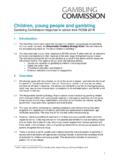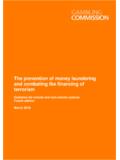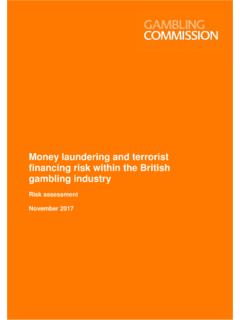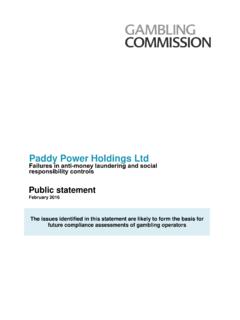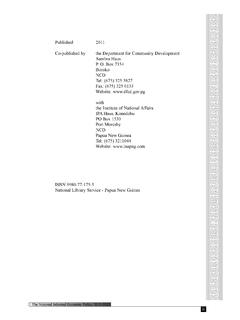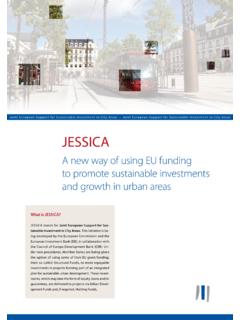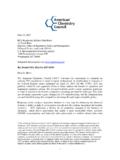Transcription of Measuring gambling-related harms
1 Heather Wardle, Gerda Reith, David Best, David McDaid, Stephen Platt Date: Version: Measuring gambling-related harms A FRAMEWORK FOR ACTION 1 Foreword by Neil McArthur, CEO Gambling Commission Collaboration to better understand gambling-related harms I am very pleased to welcome this report a result of close collaboration involving the Gambling Commission and GambleAware, and led by our expert advisers the Responsible Gambling Strategy Board based on the input of an expert group of academics and researchers. The Gambling Commission exists to safeguard consumers and the wider public by making gambling fairer and safer. To do this we need to balance consumer choice and enjoyment against the risks gambling can create and its impact on wider society.
2 Working with partners to gain a better understanding of gambling-related harms is one of the priorities we set in our three-year strategy, Making gambling fairer and safer. This document is a key step towards a better understanding of gambling-related harms . gambling-related harms include impacts on relationships, finances and health. They are experienced by individuals, families, communities, the economy and society as whole. This report provides a useful framework to consider how these harms can be measured and understood better. But the authors do not intend it to be definitive. It is a platform for further input and for taking the next steps on a set of priority topics where work can be focused on gathering the evidence we require.
3 These next steps are important to help us broaden our focus. We will move from simply identifying the numbers of people classed by screening tools as problem gamblers and consider how we will measure the real personal and societal costs which result from gambling. And most importantly, it will help us collectively to understand where best to target our resources to tackle the full range of gambling-related harms . 2 Acknowledgements A number of people have contributed helpful advice and support in the production of this document. We would like to thank members of the Responsible Gambling Strategy Board who have commented on and reviewed drafts. Thanks are also due to Marc Etches and Clare Wyllie at GambleAware, Tim Livesley, Laura Balla, Jonathan Watkin, Sarah Webster, Helen Rhodes and Tim Miller at the Gambling Commission and all other policy and academic colleagues whom we have spoken to about this project and who provided their initial thoughts and feedback.
4 Declarations of interest and authorship This document is the product of an expert panel led by the Responsible Gambling Strategy Board. Members of the panel and those present at the meetings are listed in Appendix A. GambleAware reimbursed expenses for expert panel attendance, with the exception of Heather Wardle who was reimbursed by the Responsible Gambling Strategy Board. Heather Wardle and Gerda Reith drafted various iterations of the report which was then reviewed and discussed at three face to face expert group meetings. All those listed as authors commented upon and helped to revise the draft manuscripts. All views are the authors own. Definitions Gambling / gaming: According to The Gambling Act 2005, gambling is any kind of betting, gaming or playing lotteries.
5 Gaming means taking part in games of chance for a prize (where the prize is money or money s worth), betting involves making a bet on the outcome of sports, races, events or whether or not something is true, whose outcomes may or may not involve elements of skill but whose outcomes are uncertain and lotteries (typically) involve a payment to participate in an event in which prizes are allocated on the basis of chance (Gambling Act, 2005). Health: In this report, we follow the World Health Organisation s definition and take health to mean a state of complete physical, mental and social well-being and not merely the absence of disease or infirmity (WHO, 1946). Public health: Public health can be considered as the science and art of preventing disease, prolonging life, and promoting health through the organised efforts of society' (Detels, 2009).
6 3 Contents Executive Summary .. 4 Introduction .. 6 Defining gambling-related harms .. 7 A framework for action .. 9 Estimating the social costs of gambling-related harms .. 11 Introduction .. 11 Considerations .. 12 Co-occuring health problems and attribution .. 12 Different ways of exploring social costs .. 13 What should social costs be used for? .. 14 Measures and metrics .. 14 Overview .. 14 Key metrics for the estimating the social costs associated with harms .. 17 Summary and next steps .. 20 Appendix A: Membership of expert group .. 22 Appendix B: References and evidence consulted .. 24 4 Executive Summary Background This report is the output of an expert group assembled to a) agree a definition of gambling-related harms to be used in British policy and practice, b) consider how gambling-related harms may be better understood, measured and monitored and c) to explore whether it is possible to attach some estimate of the social cost of gambling-related harms and make recommendations about how that may be done.
7 gambling-related harms definition Our proposed definition is that gambling-related harms are the adverse impacts from gambling on the health and wellbeing of individuals, families, communities and society . These harms affect resources, relationships and health. The impact from them may be short-lived but can be durable, having enduring consequences and exacerbating existing inequalities. The impact of these harms can be felt by individuals, families and communities. Framing policy action Our proposed definition highlights how the impact of harms can be felt by individuals, families and communities. It is also important to recognise that the determinants of harms can be created and shaped at each of these levels.
8 This means that sustained action to prevent gambling-related harms should include actions taken at the societal level, to change broader environments; the community level, to address local influences; the familial or peer level, to address interpersonal impact, as well as at the level of the individual. As such, we recommend adopting the socio-ecological model as a framework for preventive action on gambling-related harms . Understanding, Measuring and monitoring gambling-related harms Having offered a definition of gambling-related harms , it is important to think about how we better understand harms and increase their visibility. Part of increasing this visibility involves (but is not limited to) attempting to estimate the costs associated with harms in monetary terms.
9 To do this, we have identified a range of different metrics that are related to the experience of gambling-related harms and then considered whether social costs could be estimated for any of these. Over 50 different metrics of gambling-related harms were identified under the organising themes of resources, relationships and health. Of these, only a few areas currently have the potential to contribute to a social cost of gambling-related harms . These are: loss of employment experience of bankruptcy and/or debt5 loss of housing/homelessness crime associated with gambling relationship breakdown/problems health-related problems suicide and have recommended that these areas be pursued and that they be used in a foundation model to begi n to estimate some of the social costs associated with gambling-related harms .
10 We recognise that this will be a deeply conservative measure and hope that our framework, outlining all possible metrics of harms , allows people to easily see where the gaps exist. We also hope this is useful in stimulating conversations and actions about h ow to fill these evidence gaps. We also recognise that many of the harms listed do not lend themselves to being converted into a social cost. This does not make them any less important. We are committed to increasing the visibility of all g ambling-related harms and have suggested that further research be taken to achieve this. The content of this document is i ntended to stimulate debate and thought. We do not view it as definitive and welcome any comments you may have.
